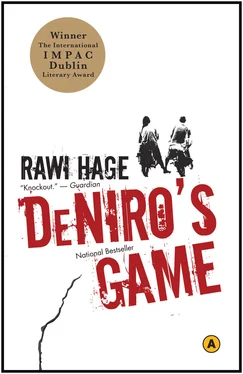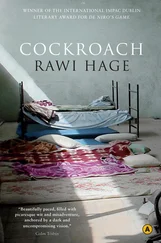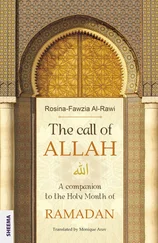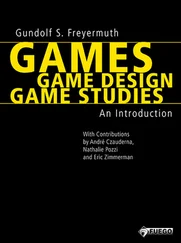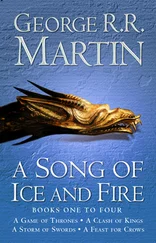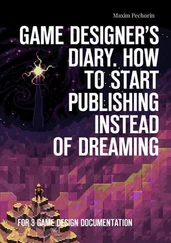But then the time passed. And that little hill where I left a virgin bride kneeling in a church pew until her thighs wrinkled and her knees turned to soap — all those years, that little hill stayed on my mind. You see, I, too, lost and gained, and took private planes, and bet on blackjack tables until the gamblers’ nails tore the green table’s lawn. . We worked those corrupt generals, we had them in the palms of our hands.
We sucked the locals’ wealth, and offered their daughters as gifts. You see, no one liked us, but they all needed us. And then it happened, that day when the poor walked barefoot into the city, with guns and machetes in their hands, and chased us out of our penthouses. They stumbled over our long chairs, defecated in our mosaic pools, snapped our argilahs (pipes) in half, camped in our marbled saloons with large windows that looked over their primitive villages, their shanty towns that we never noticed, their running sewage that we never smelled, their chocolate-skinned sisters whose bellies we used as pillows, whose pale palms we used as towels for our Semitic semen, for our sweating foreheads behind circled walls and guardian dogs.
So I escaped, leaving behind my resorts that once shone with Europeans’ and Afrikaners’ red-burned skins. I left the cars, the soap factory, my mixed-race, illegitimate descendants. I ran and came back here, looking for that virgin, looking for that childhood hill.
I am an old man now, so forgive my sentimentality. When I met Bébé she was alone. I met Bébé on the top of a hill, and I took it as a good omen. I bought her everything she needed, everything she asked for. Why? you ask. I am afraid I have nothing else to offer her, and now she is a home, a daughter, and a wife. Forgive my tears, but I am afraid that she might ask me if we can leave this place. And all I am trying to do is to spend my last days close to that hill.
Now, could you seek George for me? S’il vous plait .
THE NEXT DAY, I walked through the neighbourhood. I entered a grocery store.
We have fresh green almonds, the grocer, Julia, said to me. Good for a kass ! Do you want a kilo?
No, I’m not drinking much these days.
Do you have any empty bottles to return? I will send my daughter Souad to get them.
I am not sure. I will look in my mother’s kitchen.
Allah yirhamha , your mother was a lady. May God cut their hands. .
I bought some bread and labnah, thanked Julia, and left.
On the way back, I came across a jeep driving the wrong way. It was packed with young militiamen in green suits, and with bands wrapped around their foreheads, who pointed their rifles toward balconies and the French abat-jours . The jeep pulled up next to me, and George got out of it. He looked tired and dirty.
We just got back, Bassam, he said. Ten days without a shower. We ate canned food, and my boots are cutting the back of my ankle. Akram Seiff, you know him? We call him Alnasek, the brother of Jean Seiff.
Yes, he lives above Antoun’s Laundromat, I said.
He got hit under the arm, and he bled to death. There are fucking black Somalis fighting with those Palestinians. Did you know that? The whole ‘ummah is here fighting us.
We walked toward my house. George’s boots were rimmed with brown soil, and his beard had grown in with straight black hair. He lifted his Kalashnikov and manoeuvred with difficulty through the cars that jammed our narrow streets; he was like an American soldier with his arms above his head, advancing slowly and half-immersed through the swamps of Vietnam. On the way, we stopped at the grocer’s and picked up few green bottles of Heineken. We took the stairs up to my apartment, because in Beirut, that crowded city, the electricity came and went as it pleased. Hardly anyone used the elevators any more, and those who did risked getting stuck and spending hours in small mechanical boxes that hung from metal ropes as old and decayed as the last French soldier who left this place.
George dumped his gear and rifle on the chair in my living room. He took off his boots and lay down on the sofa.
Where did Al-Nasik die, I asked?
In Kfar Al-Wali.
How?
Open the beer and sit down. It is a long story. Are you going somewhere?
No, not yet, I replied. I opened two bottles of beer and extended one toward his chest.
No work at the port today?
Yes, but there is still some time before I go. Speak, I said, I am listening.
George took a long first sip and stretched out on the seat. He said: Warm beer. He paused, and then he talked without stopping, and I did not interrupt him.
Around four in the morning I heard some shots coming from the next village, George began. I woke up, and woke the platoon. It was freezing, with that morning mountain cold. We arrived at the village around four-thirty, maybe five. Hanfoun, the commander, was on leave. I was second in command. I split the platoon; I sent Joseph (your partner, he added, with a wink) and Alakhtabout to hold a position up the hill. We parked the jeeps at a distance, turned off the headlights, and went on foot. We moved toward the village main street. I asked Abou-Haddid to come with me, and we ran ahead of the platoon. When the day started to break, we could see more clearly. I saw a few women and kids exiting from the back of an unfinished concrete building. They were rushing down toward the valley. They carried plastic bags and wool blankets. We ran toward them. I asked them where they were going. The eldest among them, a woman with a black headscarf, told us, We are going down. Where down? I asked, snatching one of her bags, throwing it on the ground, and prodding it with my boots. They were all trembling with fear. One of the kids started to cry quietly.
I asked the woman, Where are the men?
She was silent for a moment. Then she said that she and her companions did not live here, that they were refugees looking for a place to stay but had been kicked out of the building this morning.
Who is in the building? Who kicked you out?
Men.
What men? I asked.
She fell silent again.
How many?
Two, she mumbled.
I said, Go walk, and don’t say a word or look behind you. If one of you gives a sign, I will aim at the kids first.
The women grabbed the children and rushed down into the valley, slipping and falling down the hills. All the women were in black for mourning, so I figured they must have been all related. I asked Abou-Haddid to go back and give a sign to the rest of our guys to advance.
As soon as Abou-Haddid walked back, pressing himself against the edge of a stone wall, bullets showered on him from the top of the building. He dug into an irrigation canal that crept all around the village. The water must have been freezing. When they heard the shots, the rest of the guys rushed toward us and started to fire back at the building. I was left alone under the building, you see? I was thinking: I’ll take the stairs, and engage the two men upstairs, and finish them off. But I had no sign from Abou-Haddid. I was waiting for the firing to cease so I could cross and see if he was still alive. But I tell you, this Christian man is like a frog. He slid into the water and disappeared. The whole thing was a set-up. You see, while the two men in the building got our attention, an enemy jeep was advancing from behind the platoon. A classic ambush, right? The two men in the building were planted to distract us. The only thing that saved us was that Joseph and Alakhtabout were rushing down from the hill and saw the jeep coming behind us. They engaged the men in the jeep and it was enough to warn the others. I knew something was not right when I heard fire from a different direction. I sensed it was an ambush.
Meanwhile, Abou-Haddid crawled in the canal and, like a wet rat, showed up on the other side of the building. He was shivering with cold. He took off his shirt and I gave him my jacket. Then we decided to go up to the building and finish the two men, and then go back and join the platoon. I went up first, in case Abou-Haddid’s machine gun was too soaked to fire. But, you know, the Kalashnikov is rugged; water or dust does not affect it. Fuck the M-16. It feels like a toy. An AK-47 is still the best, I tell you. That is why I switched rifles myself. Even Israelis wanted us to trade AK-47s with them.
Читать дальше
